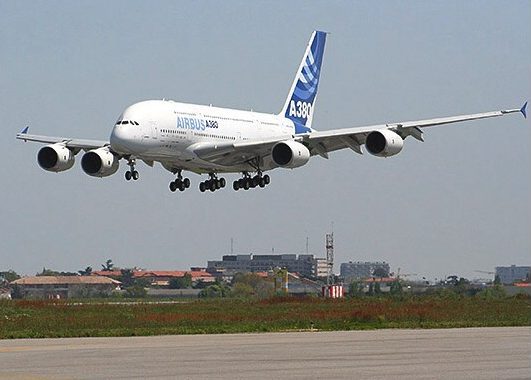-- 787 technologies to increase passenger and freighter capabilities, improve fuel efficiency, reduce noise and emissions, provide unmatched operating economics



Posted on 11/14/2005 11:28:55 PM PST by Paleo Conservative



SEATTLE, Nov. 14, 2005 -- The Boeing Company [NYSE: BA] today officially launched the new Boeing 747-8 program, which includes the 747-8 Intercontinental passenger airplane and the 747-8 Freighter airplane.
Cargolux, based in Luxembourg, has ordered 10 747-8 Freighters and will take delivery of the first 747-8F in third-quarter 2009. It also holds purchase rights for 10 additional airplanes. Cargolux currently operates an all-Boeing fleet of 13 747-400 freighters.
Nippon Cargo Airlines, based in Japan, has ordered eight 747-8 Freighters and will receive its first airplane in fourth-quarter 2009. The airline also acquired options for six additional airplanes. Nippon Cargo currently operates 13 747 freighters and has six more 747-400Fs on order.
Firm orders from the two launch customers are valued at approximately $5 billion at list prices.
"We are thrilled to have Cargolux and Nippon Cargo choose the new 747-8 and become the launch customers for this next generation of the proud and valuable 747 airplane family," said Alan Mulally, president and chief executive officer, Boeing Commercial Airplanes. "The 747-8 will use the technologies of the 787 Dreamliner to significantly increase the passenger and freighter capabilities of the 747 and offer greater fuel efficiency, improved operating economics, and be more friendly to the environment with reduced noise and emissions."
Both versions of the new 747 will feature GE's 787-technology GEnx engines, meet Stage 4 and QC2 noise requirements, have reduced emissions, offer lower trip costs and have an upgraded flight deck and an improved wing.
"The 747-8 Freighter will be very important in allowing Nippon Cargo to take advantage of the high expected cargo market growth in Asia," said Takuro Uchiyama, president and CEO, Nippon Cargo Airlines. "In addition, the 747-8 Freighter will be the world's most efficient cargo airplane, which is a key attribute with today's high cost of fuel."
Ulrich Ogiermann, president and CEO, Cargolux Airlines, said, "The Boeing 747-400 Freighter has been a cornerstone of our success, and I have high expectations that the 747-8 Freighter will build on that success and expand our capabilities worldwide. The increased payload capacity and much improved efficiency will allow us to continue our expansion and maximize our profitability. Equally important to us and the communities where we operate is the new standard the 747-8 Freighter will set in noise reduction."
The 747-8 Intercontinental passenger airplane will be stretched 3.6 m (11.7 ft) compared to the 747-400 to accommodate 34 additional seats in a typical three-class configuration. The only jetliner in the 400- to 500-seat category, it will have a range of 14,815 km (8,000 nmi) and will feature the new Boeing Signature Interior.
The Intercontinental will be quieter, produce fewer emissions, and achieve better fuel economy than any competing jetliner. It will offer 21 percent more lower-hold revenue cargo volume than the 747-400 and cost about 8 percent less per seat mile to operate. Compared to the A380, it will offer 22 percent lower trip costs.
The 747-8 Freighter will be 5.6 m (18.3 ft) longer than the 747-400 freighter. With a total payload capacity of 140 metric tonnes (154 tons), including tare weight, the 747-8F provides 16 percent more cargo revenue volume than the -400. The additional 117m³ (4,124 ft³) from the longer fuselage offers space for four additional main-deck pallets, two additional lower-hold pallets and two additional lower-hold containers. Cargo can be loaded and unloaded on the 747-8F using both the nose and side doors for maximum speed and efficiency.
Compared to the A380, the 747-8F will offer 20 percent lower trip costs. In addition, the 747-8F will maintain the operational flexibility of today's 747 freighters, with good profit potential at less-than-full loads.
The 747-8 Freighter complements the existing 747-400 freighter family, which is the air-cargo industry's standard. Both models accommodate 3.1-meter (10-foot) high pallets, providing operators with maximum flexibility.
The 747-8 also fits easily in today's aviation infrastructure, flying into more than 210 airports worldwide without additional, expensive infrastructure changes required.
The 747 freighter family currently constitutes more than half of the world's total freighter capacity. Boeing freighters of all models comprise more than 90 percent of the total worldwide freighter lift.
Boeing forecasts the need for about 900 airplanes -- passengers and freighters -- in the 400-plus-seat segment over the next 20 years. Boeing also forecasts that large widebody freighters (65 metric tons and above in capacity) will comprise 34 percent of the freighter market by 2024.


If you want on or off my aerospace ping list, please contact me by Freep mail.
Ping.
Definitely looks different from the wings on the 744.
In addition, how difficult would it be for the engineers at Boeing to extend that upper deck all the way back to the tail, if they really needed to?? I am guessing that it would not be all that difficult. If Boeing truly needed to have an aircraft to compete with the A380, I am guessing it would be fairly simple for them to transform the 747, and avoid having to design a completely new aircraft from scratch.
Translation: Times are tough all over, why would you want to buy a plane, like the one below, that will require co$tly airport modifications?

I'm not an aerospace engineer, but from what I've read, the hump is optimally placed in front of the wings. If it were moved back farther, it would increase drag. Boeing has some artists renderings of using the existing space behind the hump for crew rests, passenger bunk suites, conference centers and food cart storage areas.
I see now in the article they already have the passenger version.
GOOD BYE A380!!
Wolf
Ditto to both your comments. This is just what the industry is looking for. There are considerable concerns about operating the A380. It's one thing to prepare the infrastructure at airports scheduled to handle the A380, but what about alternates? In the Midwest, for example, airports that can handle the A380 will be few and far between for many years. The same is true in Asia.
Notice that the upper deck of the cargo version will be an unstreched 200 series upper deck. The cargo version will allow four more pallets on the main deck (two pairs) and two more pallets in the lower hold. The pasenger version will be stretched both in the lower and upper decks. The lower cargo hold on it will have one more pallet position on each side.
The whole upper fuselage is being rebuilt on those planes. Here's a link from an article I posted last February.

There are considerable concerns about operating the A380.
Well Rokke, now that you mention it, BA chief hints he may buy new Boeing, not Airbus
Is he positioning BA to get some deep discounts from Airbus or speaking the truth? Time will tell.
SEATTLE POST-INTELLIGENCER
http://seattlepi.nwsource.com/local/6420AP_WA_Boeing_747.htmlTuesday, November 15, 2005 · Last updated 12:18 a.m. PT
Boeing launching new 747 airplane
By ALLISON LINN AP BUSINESS WRITER
SEATTLE -- Boeing Co. is launching bigger, more efficient versions of its 747 jumbo jet, in a move that will put more competitive pressure on rival Airbus SAS and ensure continued production of the storied airplane.
The Chicago-based company said late Monday that Luxembourg-based Cargolux Airlines International SA has ordered 10 freighter versions of the new airplane, dubbed the 747-8, with purchase rights for 10 more. Nippon Cargo Airlines of Japan has ordered eight of the freighter planes, with options for six more. Both airlines will begin receiving the planes in the latter half of 2009.
The firm orders from the two companies are worth $5 billion at list prices, although airlines typically negotiate steep discounts.
"We are thrilled to have Cargolux and Nippon Cargo choose the new 747-8 and become the launch customers for this next generation of the proud and valuable 747 airplane family," Alan Mulally, head of Boeing's Seattle-based commercial airplanes division, said in a statement.
The new airplanes will use technologies and General Electric Co. engines designed for Boeing's forthcoming 787 airplane to make the 747 quieter and more efficient, Mulally said.
The new passenger version of Boeing's four-engine widebody airplane will seat 450 people, up from 416 in the most current model, and will feature a redesigned interior. It will be nearly 12 feet longer than the current 747, and will be capable of flying 9,200 miles.
The freighter version will be about 18 feet longer than the current freighter model, the 747-400.
Both versions of the current 747 are nearly 232 feet long.
Analyst Richard Aboulafia said the 747-8 launch will likely increase pressure on rival Airbus, which is preparing for its superjumbo A380 to enter service next year. A new, slightly larger 747 could potentially reduce the market for Airbus's plane, a mammoth offering that can carry between 550 and 800 passengers in a doubledecker cabin.
"It helps box the A380 into an even smaller niche," Aboulafia said.
Airbus has won 159 firm orders for the A380 so far, at a list price of $292 million.
Boeing had been shopping a redesigned 747 around for more than a year, as it sought to garner enough interest to launch the new plane.
Without a new model, some had begun to question how long production would continue for the 747, a fabled workhorse that has been in the skies for 35 years. Boeing has recently seen business pick up somewhat for the freighter version of its current 747 model, but the company has not received an order for a passenger 747 in several years.
Aboulafia said he expects that the bulk of the orders for the new 747 will also be for the freighter version, but he thinks some passenger versions will be built.
"This would remove any uncertainty about the 747 line," he said.
Here's a cool website.
http://747.newairplane.com/
The curvature of the wing discourages the airflow from applying downward pressure to the top of the wing. Less down = more up. :-)
Disclaimer: Opinions posted on Free Republic are those of the individual posters and do not necessarily represent the opinion of Free Republic or its management. All materials posted herein are protected by copyright law and the exemption for fair use of copyrighted works.